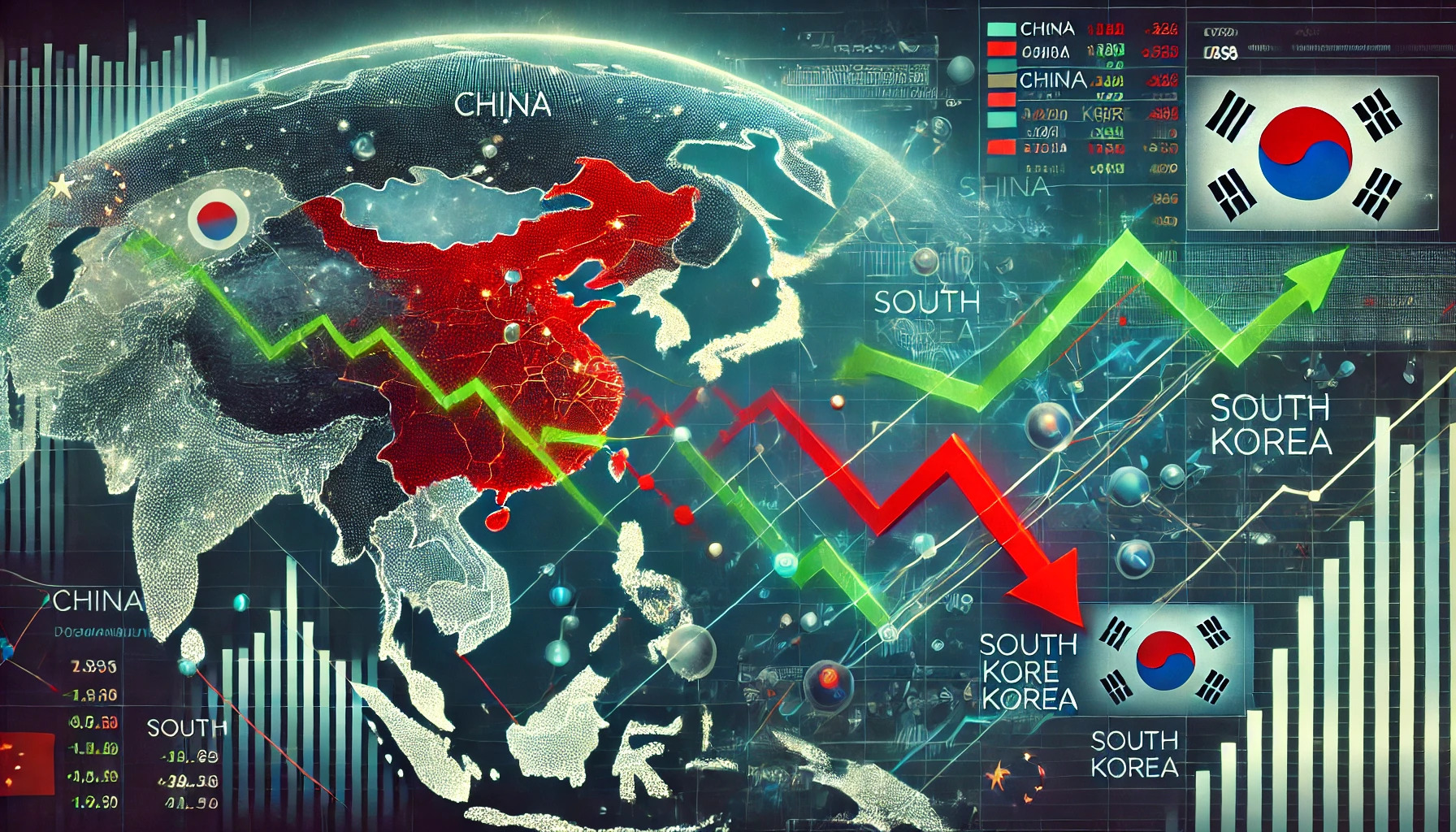Asian Markets Slide as China’s Stimulus Uncertainty Looms, South Korea Rises on Interest Rate Cut
On Friday, most Asian stock markets experienced a decline, primarily driven by concerns over China's fiscal stimulus measures. In contrast, South Korean stocks advanced after the Bank of Korea (BOK) implemented a rate cut. Broader Asian markets were muted as hotter-than-expected U.S. inflation data cast doubt on the extent of future interest rate cuts by the Federal Reserve.
Wall Street Influence and U.S. Inflation Concerns
Following Wall Street's slight drop on Thursday, where inflation data raised expectations of a smaller rate cut from the Federal Reserve in November, Asian markets followed suit with a negative lead. The market sentiment was further pressured as investors speculated on the potential for more restrained rate cuts.
Meanwhile, U.S. stock index futures showed modest gains during Asian trading hours, with attention focused on the upcoming third-quarter earnings season.
Chinese Stocks Decline as Investors Await Fiscal Stimulus
Chinese stocks, including the Shanghai Shenzhen CSI 300 and Shanghai Composite Index, dropped between 1.5% and 2%. This decline followed a volatile Thursday session, with investors anticipating updates on fiscal stimulus measures. The Chinese finance ministry is expected to host a briefing on Saturday, where it will unveil its latest economic support measures.
Despite recent rounds of monetary stimulus from Beijing, investors have expressed skepticism, pushing for more targeted fiscal measures to boost the economy. Analysts predict that China could introduce up to 2 trillion yuan ($283 billion) in fiscal stimulus, focusing on enhancing private consumption.
Chinese stocks had previously rallied to two-year highs on the optimism of more stimulus. However, the rally has since stagnated, with concerns about China's elevated debt levels and limited fiscal flexibility. Investors remain cautious, wondering how much more Beijing can realistically offer.
Hong Kong and Broader Asian Market Performance
Hong Kong markets were closed for a public holiday, while other major Asian indices faced similar pressure. Australia's ASX 200 dipped 0.1%, and Japan’s Nikkei 225 and TOPIX traded mostly sideways, reflecting overall uncertainty in the region.
In contrast, India's Nifty 50 index futures pointed toward a slightly positive opening, recovering from a sharp decline in recent weeks.
South Korean Stocks Surge After Interest Rate Cut
South Korea’s KOSPI index saw a 0.3% rise, buoyed by the Bank of Korea’s decision to cut interest rates by 25 basis points, bringing the rate to 3.25%. This was the BOK’s first rate cut in over four years, signifying a shift from its previously restrictive stance. The rate cut is expected to help bolster economic growth, which has been slowing, along with falling inflation rates and a cooling housing market.
The BOK’s move signals a strategic change aimed at supporting the local economy as it faces both domestic and global challenges.



 Trump Signs Executive Order Threatening 25% Tariffs on Countries Trading With Iran
Trump Signs Executive Order Threatening 25% Tariffs on Countries Trading With Iran  Thailand Inflation Remains Negative for 10th Straight Month in January
Thailand Inflation Remains Negative for 10th Straight Month in January  South Africa Eyes ECB Repo Lines as Inflation Eases and Rate Cuts Loom
South Africa Eyes ECB Repo Lines as Inflation Eases and Rate Cuts Loom  Dow Hits 50,000 as U.S. Stocks Stage Strong Rebound Amid AI Volatility
Dow Hits 50,000 as U.S. Stocks Stage Strong Rebound Amid AI Volatility  Vietnam’s Trade Surplus With US Jumps as Exports Surge and China Imports Hit Record
Vietnam’s Trade Surplus With US Jumps as Exports Surge and China Imports Hit Record  U.S. Stock Futures Slide as Tech Rout Deepens on Amazon Capex Shock
U.S. Stock Futures Slide as Tech Rout Deepens on Amazon Capex Shock  Japan Economy Poised for Q4 2025 Growth as Investment and Consumption Hold Firm
Japan Economy Poised for Q4 2025 Growth as Investment and Consumption Hold Firm  Dollar Steadies Ahead of ECB and BoE Decisions as Markets Turn Risk-Off
Dollar Steadies Ahead of ECB and BoE Decisions as Markets Turn Risk-Off  Global Markets Slide as AI, Crypto, and Precious Metals Face Heightened Volatility
Global Markets Slide as AI, Crypto, and Precious Metals Face Heightened Volatility  Gold and Silver Prices Slide as Dollar Strength and Easing Tensions Weigh on Metals
Gold and Silver Prices Slide as Dollar Strength and Easing Tensions Weigh on Metals  Trump Endorses Japan’s Sanae Takaichi Ahead of Crucial Election Amid Market and China Tensions
Trump Endorses Japan’s Sanae Takaichi Ahead of Crucial Election Amid Market and China Tensions  India–U.S. Interim Trade Pact Cuts Auto Tariffs but Leaves Tesla Out
India–U.S. Interim Trade Pact Cuts Auto Tariffs but Leaves Tesla Out  Singapore Budget 2026 Set for Fiscal Prudence as Growth Remains Resilient
Singapore Budget 2026 Set for Fiscal Prudence as Growth Remains Resilient  South Korea Assures U.S. on Trade Deal Commitments Amid Tariff Concerns
South Korea Assures U.S. on Trade Deal Commitments Amid Tariff Concerns  Silver Prices Plunge in Asian Trade as Dollar Strength Triggers Fresh Precious Metals Sell-Off
Silver Prices Plunge in Asian Trade as Dollar Strength Triggers Fresh Precious Metals Sell-Off  U.S.-India Trade Framework Signals Major Shift in Tariffs, Energy, and Supply Chains
U.S.-India Trade Framework Signals Major Shift in Tariffs, Energy, and Supply Chains  Fed Governor Lisa Cook Warns Inflation Risks Remain as Rates Stay Steady
Fed Governor Lisa Cook Warns Inflation Risks Remain as Rates Stay Steady 































